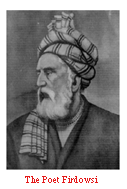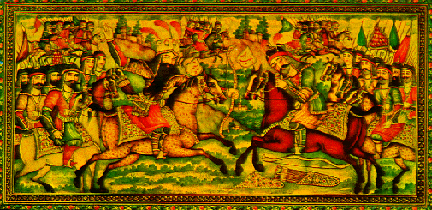
The Role of the Shahname in Iranian Society
by
 |
The Role of the Shahname in Iranian Society by Iraj
Bashiri
|
As the most instrumental, influential, and constructive literary contribution to the reestablishment, in medieval times, of the Persian language and Iranian culture, Firdowsi's epic permeates many aspects of Iranian society, especially the lives of those who cherish Iran's ancient legacy. The epic spans the cosmological, mythological, and historical eras not only for those who populate present-day Iran, but those who populate the land where the events in the epic took shape, the Afghans, the Tajiks, the Uzbeks, and the Kyrgyz. Discourse on the epic tends to distinguish the Iranians, i.e., those living within the political boundaries of present-day Iran, as the heirs to Firdowsi's contribution; but that would be too narrow a view both of the epic and of the vision of its creator. People who outwardly seem to have nothing, or, at most, very little in common, enjoy the bard's contribution to Asian culture and commemorate it in "Shahname Recital" sessions, "Shahname show" presentations, and by reciting the epic in teahouses, and in sports clubs (zurkhaneh).
Shahname Recital
Firdowsi could have written the Shahname in prose to present a detailed account of the activities of Iran's mythical kings and champions, but he did not. Rather, he chose the medium of poetry through which he could produce a multi-volume oeuvre providing the same information. He chose poetry because prose was not as accessible to his illiterate audiences as was poetry. In other words, around AD 1000, the Iranians' capacity for retaining large tracts of poetry in memory was superior to their ability for retaining many lines of prose text. Besides, he intended the stories in his epic to become part of the daily life of his contemporaries, irrespective of their Persian, Arab, or Turkish ethnic background. The success of his epic, especially its safe passage through the devastation of the Mongols to modern times owes a great deal to this initial correct decision.
|
One place
where the general public, especially the lower classes, can hear the Shahname
recited is in the corner of the public bazaar. There, an individual, usually
referred to as Dervish, presents an episode of the Shahname. In
doing so, he uses a canvas that unrolls like a screen as a prop. Pictures
depicting the heroes of the Shahname episode that he is about to
recite mesmerize the onlookers. The contents of the episode, once recited,
fascinate the audience and leaves them with a sweet memory of their visit
to the bazaar or, in the case of the villagers, to town. Master couplets
(shah bayt) from the epic leave an indelible mark on their memory
prompting them to return, to listen to more, and to learn more heroic
verses so that they can become the story teller in their own district
or village and astonish audiences. It is important to note that in times
prior to radio and television, for some Iranians, this was the only opportunity
they had to become acquainted with their national epic. The picture that
these recitals presented was a simple image that emphasized both the audience's
Islamic and national Iranian identity. The choice of which aspect or episode
to present and where to place the emphasis, depended on the social and
political needs of the time. |

|
Another place where one can enjoy listening to the Shahname is in the teahouse (qahvekhane). The audience at the qahvekhane (lit., coffee house) is somewhat different from that at the bazaar. Here, we encounter the regular patrons of an establishment as opposed to the one-time visitor in the market place. The patrons of the teahouse include shopkeepers, drivers, office workers, managers, policemen, and the like. Although they may not wish to participate in the recitation of the epic, they enjoy hearing the exploits of the heroes of the epic while sipping their tea. The Shahname allows their imagination to be taken to realms that, in reality, are beyond the bounds of their earthly existence. The teahouse keeper provides the service in order to sell more tea, cigarettes, and tobacco for the hookas and the long-stem pipes. The audience for the teahouse is better educated than the first group. Some teahouses advertise the particular episode that will be presented and the specific time for the presentation.
More educated Iranians form Shahname recital groups and, over a lengthy period of time, recite the 60,000 couplets of the epic, episode by episode, and discuss their import. These gatherings are usually held in private homes. The participants rotate the difficult task of recitation, which is, at times, accompanied by music. Often they engage in a discussion of the finer points of the epic. All this happens, very much as it did in the teahouse, except in the context of enjoying the hospitality of a host and his family.
Yet another place where the Shahname is recited with fervor is at the zurkhaneh (house of strength). This is a Persian-style sports club, where athletes undergo a rigorous regiment of training under the direction of tested masters (murshed). The aim of the endeavor is to perfect the body and the mind at once. Like in ancient Greece, in ancient Iran, too, development of physical and mental faculties was among the most sought after aspects of an accomplished person's career.
Two types of zurkhaneh are responsible for the two types of athletes trained in Iranian sports clubs. Some zurkhanehs emphasize Iranian nationalist sentiments. Their code of chivalry, described below, promotes ancient Iranian ethics, especially those advocated by ancient Iranian saint-kings like Kaykhusrau, as well as such historical monarchs as Darius the Great and Ardashir I. The other type of zurkhaneh emphasizes the Iranians' ties to the Shi'ite faith. The code of ethics in these sports clubs includes praises of the Prophet Muhammad, the Saint Ali, and the descendants of Ali. Their code of conduct, too, is presented further below.
Recitation of the Shahname over a long period of time, rigorous training that promises the individual to become a Rustam or a Siyavosh, learning the code of conduct of the Saint Ali, taking an oath to follow the code of ancient kings and of the leaders of the Shi'ite faith, all of these are likely to influence a young mind determined to contribute to the well-being of his society. Depending on the socio-religious, socio-political, and socio-economic direction of the society, as well as on the desire of the individual athlete, a number of social categories appear. An individual might fall into one or more of the following groups: dash, sufi, qalandar, malamati, and ayyar. In what follows an attempt will be made to distinguish these categories. It should be understood at the outset, however, that these categories are not divisible into the neat columns we would like them to fall into. There are major overlaps. Additionally, none of these categories can be defined with a few words or a few sentences. They are ways of life that grow out of the fabric of the culture and must be mastered by examining the total culture.
Dash (short form of dadash, Turkish word for brother) is a title of respect conferred on a graduate of the traditional sports clubs. Known also as dash mashdi, he shares a number of his traits with the sufis, malamatis and qalandars. Drawing on the strength of his character, as well as on his physical strength, which in his case is a given, a dash tends to be detached from the world--not in the sense of the sufi mystic but in the sense of the hermit warrior. During the days when cities were surrounded by walls and were divided into distinct districts, the dash served as the tough guy of the district. The oppressed sought him out to gain justice against the oppression of feudal lords and their demanding families. Orphans, families who, for one reason or another, were left without protection temporarily or permanently, were sure to receive protection from the dash. Often, a dash deposited a strand or two of his hair as assurance that he would see to the well-being of a family or a child, or someone's property. You could trust that he would protect all that he had pledged to protect to the point of his death.
The sufi is the most well-known of the group of individuals who undergo rigorous training to improve their body and mind. The difference between a dash and a sufi is in that the dash is a product of the zurkhaneh, while the sufi is a product of the khaniqah or cloister. They both are trained by tested masters (murshed) but the orientation of their studies differs. The sufi's orientation is towards cognition of the godhead; the dash strives to learn the tested ways of past saints and champions to forge a tool for the betterment of society. The stations and states that a sufi passes as he walks the tariqa are explained in Islam and Iran to AD 1400.
The qalandar is a difficult individual to explain. Like a dash, he seeks the well-being of people in general but, unlike the dash, he does not interfere with the social order. He does not look after other people's property or worry about the orphans and their problems. He is, however, tied to the spiritual dimension of which the sufi is a part. Unlike the sufi, however, he does not flaunt either his devotion or the extent of the arduous rituals he performs.
The malamati is a sufi who passes the state and stations only to become cognizant of the extent of his inability to measure up to the perfection required. He blames himself for everything and draws blame against himself by hiding rituals and by uttering words that, on the surface, sound blasphemous. Hafiz of Shiraz is a prominent malamati figure. Many of his ghazals (sonnets) point to the inadequacies of the world and, thus, of the individual who is no more than a spec of dust at the threshold of the Beloved.
The ayyar is a dash-type individual who lives by the strength of his wit. He participates in battles and might gather like-minded individuals to instigate uprisings against the mighty in society. In this endeavor, his main intention is to improve the social situation for his people, but in the end, he might end up with the kingship or rulership that he had lived to despise.
Finally, a word about the dervish. He is the individual who has tried his hand at one of the categories outlined above but has failed to master the task. A dejected sufi, a timid dash, or a defeated ayyar might appear in society in the guise of a mendicant, seeking his living through charity extended to him as he travels from village to village and town to town, praising the Lord.
National Champion's Code of Ethics
Islamic Champion's Code of Ethics